|
|
|
Sort Order |
|
|
|
Items / Page
|
|
|
|
|
|
|
| Srl | Item |
| 1 |
ID:
061466
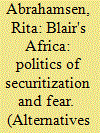

|
|
|
|
|
| Publication |
Jan-Mar 2005.
|
|
|
|
|
|
|
|
|
|
|
|
|
|
|
|
| 2 |
ID:
050086
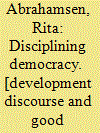

|
|
|
|
|
| Publication |
London, Zed Books, 2000.
|
| Description |
168p.
|
| Standard Number |
185649859X
|
|
|
|
|
|
|
|
|
|
|
|
Copies: C:1/I:0,R:0,Q:0
Circulation
| Accession# | Call# | Current Location | Status | Policy | Location |
| 047482 | 338.96/ABR 047482 | Main | On Shelf | General | |
|
|
|
|
| 3 |
ID:
172425
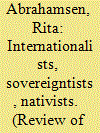

|
|
|
|
|
| Summary/Abstract |
Contrary to common assumptions that the liberal world order was ‘made in the West’, this article argues that it was produced in interaction with Pan-African ideology and actors. Developing a morphological analysis, it identifies three contending visions of world order within Pan-Africanism: a world of continental unity and transnational solidarity; a world of national sovereignty; and a world of racially defined units. It concludes that Pan-Africanism contains intellectual and political resources for the defence, reinvigoration, and invention of a more just, equal and rule-bound multilateral world, but that this cannot be taken for granted. Pan-Africanism is neither inherently progressive, nor reactionary, and can support multilateralism and sovereigntism in equal measure. Pan-Africanism's nativism also carries particular risks at a time when similar identitarian viewpoints are promoted by Radical Right movements. Understanding the manner in which Pan-Africanism informs and legitimises diverse political agendas is thus of crucial importance for IR, for Pan-Africanists, and for the future of world order.
|
|
|
|
|
|
|
|
|
|
|
|
|
|
|
|
| 4 |
ID:
157918
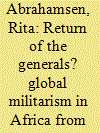

|
|
|
|
|
| Summary/Abstract |
Militarism is always historically constructed and context specific and must therefore be studied at the intersection of the global and the local. This article does so by tracing the continuities and changes of global militarism in Africa from the Cold War to the present. It argues that contemporary global militarism on the continent differs from its predecessor in two crucial aspects. First, it is promoted by development actors as much as by military establishments and is more firmly embedded within discourses of development and humanitarianism. Second, contemporary militarism remains focused on political order and stability but it is more concerned with war and direct combat. The article probes this paradox through an engagement with the concepts of security and securitization. It argues that today’s militarism is suffused with the values of security and that it is precisely the logic of security and securitization that gives it its contemporary political force.
|
|
|
|
|
|
|
|
|
|
|
|
|
|
|
|
| 5 |
ID:
077392
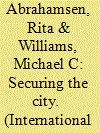

|
|
|
|
|
| Publication |
2007.
|
| Summary/Abstract |
The past decade has witnessed a remarkable expansion and globalisation of the private security sector. These developments mark the emergence of public-private, global-local security networks that play increasingly important roles in global governance. Rather than representing a simple retreat of the state, security privatisation is a part of broad processes in which the role of the state - and the nature and locus of authority - is being transformed and rearticulated. Often presented as apolitical, as the mere effect of market forces and moves towards greater efficiency in service delivery, the authority conferred on private actors can alter the political landscape and in the case of private security has clear implications for who is secured and how. The operation and impact of public/private, global/local security networks is explored in the context of security provision in Cape Town, South Africa.
|
|
|
|
|
|
|
|
|
|
|
|
|
|
|
|
| 6 |
ID:
087311
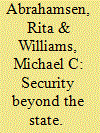

|
|
|
|
|
| Publication |
2009.
|
| Summary/Abstract |
To date, most discussion of security privatization in international politics has been focused on the role of private military companies and mercenaries. This article seeks to shift the focus away from the battlefields and toward the less spectacular privatization and globalization of commercial private security. Drawing on Saskia Sassen's notion of state "disassembly," we situate the growth of private security within broader shifts in global governance. Pointing to the weakness of seeing the rise of private security as an erosion of state power and authority, we show instead a re-articulation of the public/private and global/local distinctions and relationships into what we term "global security assemblages." Analyzing the role of private security in two such assemblages in Sierra Leone and Nigeria, we show how a range of different security agents and normativities interact, cooperate and compete, to produce new institutions, practices and forms of security governance. Global security assemblages thus mark important developments in the relationship between security and the sovereign state, structures of political power and authority, and the operations of global capital.
|
|
|
|
|
|
|
|
|
|
|
|
|
|
|
|
|
|
|
|
|